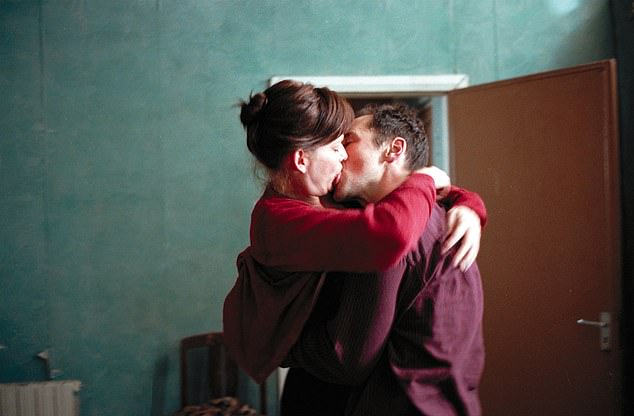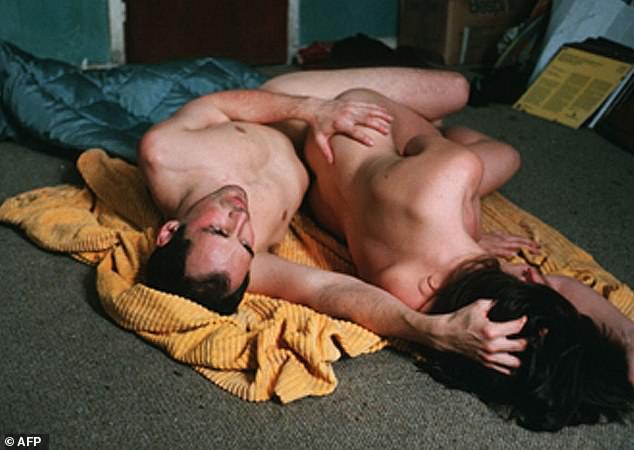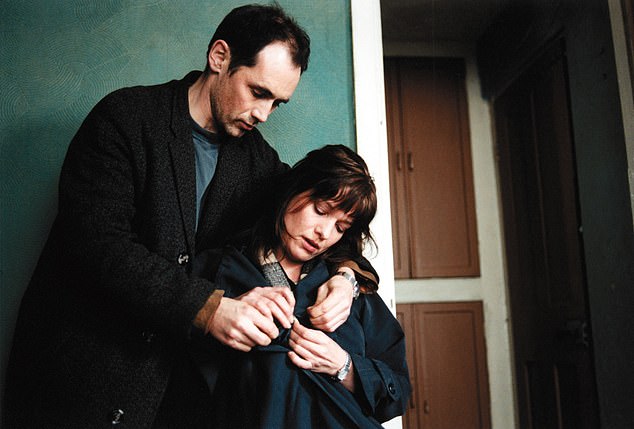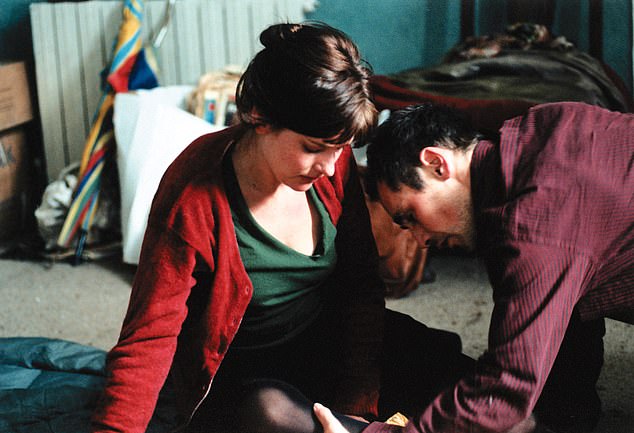Intertwined on the carpeted floor of a grubby London flat, a couple embrace in silence.
For a moment they kiss and fondle each other as the camera slowly follows their movements, unflinching.
And then, naked and exposed, with no props or prosthetics to fall behind, the most intimate scene of all.
The shot is only brief, a few seconds at most, but it was enough to shock audiences and reviewers into speaking almost of nothing else.
Intimacy (2001), directed by the late French filmmaker Patrice Chéreau, follows a chapter in the life of a man who finds himself living apart from his estranged family.
Jay (Mark Rylance) begins a detached tryst with a woman, Claire (Kerry Fox), which becomes complicated by emotional attachment and is, finally, shattered by reality.
Against the gloomy exploration of the characters, moments of crude intimacy – fumbling and spontaneous – colour their lives.
But it was the inclusion of a particular moment between the two, in which she performs oral sex on him, that audiences were unable to turn away from.
The act – at least that part of it – was real. In pursuit of authenticity, Chéreau took the bold decision to show the characters at their most vulnerable as he tried to tell their stories.
But behind the characters were actors, real people with real partners who all became entangled in the film’s verisimilitude.
For some, Intimacy was a mistake, for others not. But all acknowledged the strain this ambitious venture placed on their real-world relationships.

Rylance (right) said he was affected by the fallout from the scene after it came out
The opening scene of Intimacy paints a bleak picture of Jay’s life since separating from his wife. ‘Was this agreed?’ are his first words to break the silence as Claire, a drama teacher and struggling actress, arrives on his doorstep.
Jay appears dismissive, preoccupied, as he invites Claire into his run-down flat in south London. Within minutes, they are having sex. Much of the film is shot on hand-held cameras, but the sex scenes are still, focused and drawn out.
Intimacy delivers on the promise implied in the title. The moments between the couple are close, fully exposed to the audience. Almost immediately, the viewer is confronted with full frontal male and female nudity.
Told from Jay’s perspective, we learn little about Claire in the opening scenes. In the same moments, we see everything.
At this point, we do not know their names, what they do or how they know each other. And yet, we are invited into an unabridged screening of their sex lives.
The contrast is key as their affair unfolds for the audience, ultimately contorting – for Jay, at least – into seemingly genuine romantic interest.
Slowly, as Jay’s interest piques, we learn more about both characters. As he seems to develop a genuine interest in Claire, the moments of intimacy become increasingly profound.
The portrayal of sex in film is nothing new. But the unsimulated oral sex scene – arriving at the peak of the couple’s intimacy, and the nadir of his reflections on his relationship with his family – caused quite the stir.
Critics, broadly approving of the film in its totality, branded the scenes ‘pornographic’ and probed their ‘justification’.
‘They’re really doing it, and it’s really them doing it,’ began Peter Bradshaw in his review for the Guardian.
‘Patrice Chereau’s controversial new film Intimacy begins with thirty-five minutes of graphic sex,’ opened Alan A. Stone’s for the Boston Review.
Rotten Tomatoes, aggregating film reviews, gives the film a score of 66 per cent from 71 critic reviews, and 58 per cent from more than 2,500 ratings.
Some talk of the lofty themes of alienation and the appeal to ‘authenticity’. Others felt the ‘real’ sex did little to make the characters’ ‘vacuous’ lives seem less vacuous.

Rylance and Fox spoke of the challenges of the scenes they shared
In an audacious effort to present fiction as reality, it was perhaps inevitable the lines, at times, became blurred.
Richard Linklater, boyfriend at the time to actress Kerry Fox, wrote candidly about the challenges of being on the periphery of the film as his partner left for rehearsals each day, knowing what the performance demanded from her.
Initially, they had both wondered how the director would dupe the audience into believing that Jay and Claire had performed the act without breaking the suspension of belief.
Chéreau’s answer was that there would be no deception.
There was ‘an impulse to know how far I could extend the boundaries of my possession of Kerry, and still feel the same about her,’ Linklater assessed in a 2001 comment piece for the Guardian.
‘Or, rather, I knew I wouldn’t feel the same about her. Ahead lay an obscure destination of the heart. Would it be better, or worse? If it didn’t ruin us, would it make us stronger?
‘Frankly, neither I nor (despite her experience) Kerry had any idea what it would be like, or what effect it would have on us.’
Before the film had been shot, Linklater realised that if it did go ahead, he would have to wait and wonder as she rehearsed. Eventually, he would have to watch the scenes – with the public – and see everything they had done together.
‘Or, after editing, not quite everything. Which is the worst? Seeing nothing, or something, or everything?’
Shooting put a strain on Fox, too. The film’s motifs are difficult to reconcile, but there was ‘no question’ that the sex scenes were the most demanding, Linklater said.
He said his partner, who he had only known for six months at that point, would come home from shooting exhausted and almost ill.
The erotic scenes were all said to have been shot in a single week of filming.
Fox would return with carpet burns from the coarse, grey floor in the flat.
Asked by Metro in 2012 whether she regretted a real sex scene in the film, she gave a pithy response.
‘I absolutely have no regrets and it’s one of the best pieces of work I’ve ever done,’ she said.
Twenty four years on, Fox and Linklater are still together and have two children.

The film follows Jay (left) and Claire (right) as they navigate a secret love affair
According to Linklater, Kerry had said that she had wanted to take a chance on these kinds of scenes ‘because I’ve never seen it done before’.
The film is realistic, honest in its portrayal. As Linklater himself suggests, the ‘need’ to show real oral sex, ‘even if briefly’, stems from a directorial desire for ‘integrity’.
‘Although brief, it completes the illusion for the audience,’ he added. ‘Because we can see this thing happening, we are allowed to feel that everything is.’
‘The movements’ between the pair, Linklater says, ‘are gentle and humane’. They reveal something about the characters. As Jay reckons with the loss of his wife and children, the detail helps explain the entanglement that follows.
The point of the art and its composites can be rationalised. But the cast and their extensions were aware that such an intimate act, even as part of a performance, had the impact to shake the real world.
Kerry, Linklater said, ‘attracted a particular kind of British press attention’ for her role as the elusive paramour of the lead in the run up to the film’s release.
Rylance, too, resented that the performances were overshadowed by a few moments of raw intimacy.
‘It soured me on my life two months,’ Rylance told the Wall Street Journal in 2015.
He felt that he had given everything to the performance – which was acknowledged when the film won the Golden Bear for Best Film at the Berlin International Film Festival in 2001 – but attention crowded the sex scenes instead.
The moments between Rylance and Fox on stage – particularly the oral sex scene – sent the actor into what the outlet described as a ‘deep funk’ and caused ‘understandable stress on his marriage’.
‘It’s my mistake,’ he told the WSJ. ‘But I felt Patrice [Chéreau] put undue pressure on me on set to do that.
‘And at that point I didn’t have the confidence as a film actor to say no.’
In fact, immediately after the release of the film, critics raised the same concerns.
Charlotte Raven, writing for the Guardian, said ‘the real issue’ with the film’s portrayal of ‘”real” sex’ has ‘nothing to do with the way the actors felt about doing it’.
‘Far more important is the issue of what the director was thinking of and whether his decision to push the envelope was well founded.’

The film was widely commended for its realistic depiction of the affair
Intimacy is a compelling exploration of the intersecting lives of two ordinary people in London dealing with their own strained relationships.
Scenes of closeness between two people, moral judgements aside, stood vibrantly against their misery beneath the surface.
So compelling were the performances that the film, unprecedented in ambition, was recognised with mulitiple awards at festivals around the world.
Mark Rylance was married to Claire van Kampen from 1989 until her death in January.












